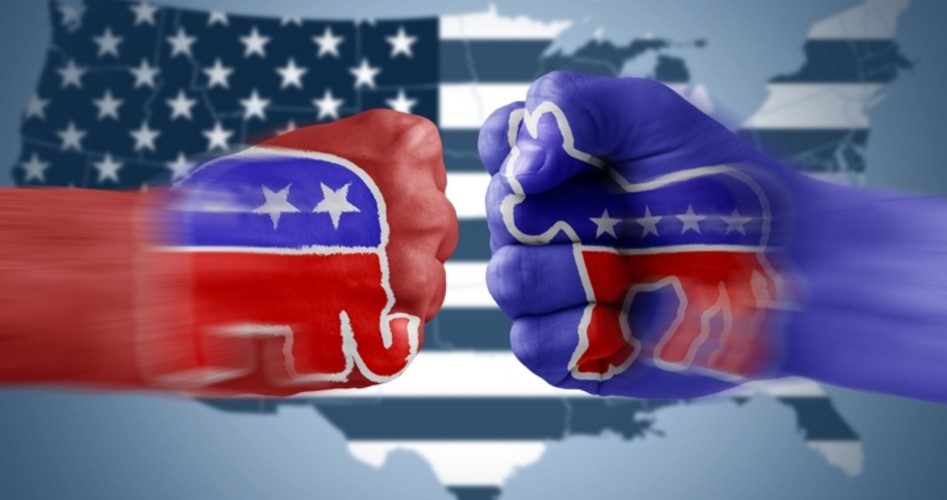
Peace and love, flowers in their hair, and stopping the hate — and wishing their subhuman political opponents dead. Liberal Atlantic magazine recently commissioned a study of “political prejudice” in America, and in a perhaps hypothesis-busting result learned that the most politically intolerant county is also one almost monolithically liberal.
Introducing the subject, American Thinker’s Thomas Lifson reports, “I can’t help but suspect that the flattering but incorrect self-image of progressives as being tolerant and conservatives narrow-minded was behind the project. But that’s not how it turned out. Two different articles (here and here) lay out the results with all the many assumptions and limitations that must be held in mind.” But the following Atlantic paragraph is instructive:
The most politically intolerant county in America appears to be Suffolk County, Massachusetts, which includes the city of Boston. In this part of the country, nine out of every 10 couples appear to share the same partisan leaning, according to the voter-file data. Eight out of every 10 neighborhoods are politically homogeneous. This means that people in Boston may have fewer “cross-cutting relationships,” as researchers put it. It is a very urban county with a relatively high education level. All these things tend to correlate with partisan prejudice.
“Suffolk County gave 79.5% of its votes to Hillary Clinton and only 16.5% to Trump in 2016,” Lifson then informs. “Meanwhile, the most politically tolerant county is Jefferson County, around Watertown, N.Y., [and] rated an entire article. Jefferson County is Trump Country, handing him more than a 22-point margin over Madame Clinton, 58.2% to 35.9%.”
None of this surprises Lifson, an ex-Ivy League professor. Relating a story familiar to conservatives, he writes, “I could have told them [the researchers] this for much less money. When I began questioning liberalism and the Democrats (it took me until the 1980s), I immediately discovered after the first political meetings I attended that conservatives engaged in civil debate while, as a veteran of decades in Cambridge, Mass. and Berkeley, Calif., I was accustomed to subjects being dropped because they would only cause name-calling.”
Many studies bear out such anecdotes, too. I just reported earlier today, in fact, on research finding a “stunning” intolerance level at left-wing Big Tech companies such as Google, Facebook, and Twitter. Then there was the 2018 college study indicating that Democrats are far less tolerant than Republicans.
Moreover, if Lifson is correct and the Atlantic liberals, in the grip of their own prejudices, had a left-wing-doctrine-born hypothesis that was refuted, it wouldn’t be the first time. For example, Google just conducted a study to ascertain if it was underpaying women and minorities — but learned that it was the men who were getting less money for similar work. (But dogmas die hard. The New York Times reported on this story yesterday, but devoted the majority of its words to libsplainin’ why pay scale is an insufficient yardstick for measuring discrimination. And so the ever-shifting goalposts strike again.)
Related to this, there also was the striking 2008 article, “Don’t listen to the liberals — Right-wingers really are nicer people, latest research shows.”
They also may be deeper people, as the Atlantic piece is typical of today’s left-media in that it’s a rather shallow treatment of its subject matter. For example, the magazine writes, “Most of us now discriminate against members of the other political side explicitly and implicitly — in hiring, dating, and marriage, as well as judgments of patriotism, compassion, and even physical attractiveness, according to recent research.”
Yet is this really new? Didn’t people years ago discriminate in most (if not all) of the above areas — against people of different religions? The difference is that, today, ideology has supplanted religion.
No, Westerners don’t now fight wars much over “religion” (in reality, we never did; most conflicts were caused by a desire for land, resources, or glory).
Now we may fight them over ideology, as the 20th-century conflicts involving Nazism and Marxism evidence.
We don’t settle First Things — i.e., theology, philosophy — thinking they’re inconsequential things. Instead we kick that can down the road, get First Things wrong, and proceed to fight over secondary things, which, of course, we’ve consequently also gotten wrong. Then we congratulate ourselves for being more enlightened than our faithful forebears who would “fight over religion.”
The Atlantic also makes the common mistake of sloppily labeling all extreme partisan opinions “prejudice.” Yet as the word implies, “prejudice” means to prejudge; it is “an unfavorable opinion or feeling formed beforehand or without knowledge, thought, or reason.”
Of course, much of the partisan hatred can be attributed to prejudice. But there are also things called principles, which are well considered expressions of Truth that can properly guide behavior.
For example, the Atlantic and others lament these now Divided States of America. But the discord is not, as some would claim, the work of President Trump or even, for that matter, the world’s Barack Obamas (this isn’t to imply that Obama-like demagogues can’t exacerbate problems). It’s not caused by modern technology, the “times,” or some mysterious force. Rather, we’re divided over fundamental issues.
Today we disagree on important matters that long ago united us: life (i.e., prenatal infanticide), what is marriage, what is proper sexuality, and even sex itself (“transgenderism”). It’s not just that you say potāto and I say potăto. When we can’t even agree on what boys and girls are, well, serious problems exist that mere slogans and pep talks won’t remedy.
Note here that marriages have ended over such fundamental disagreements — and nations can, too. This is why “discriminating” in hiring, dating, and marriage can make sense. If you’re right in your principles and someone wholly rejects them, is it rational to think he’ll be compatible with you? What are the chances he’ll be a good spouse or employee?
This brings us to “intolerance,” which the Atlantic and many others bemoan but don’t understand. I addressed this yesterday, and today I’ll present what late Archbishop Fulton J. Sheen profoundly wrote on the matter in 1931:
America, it is said, is suffering from intolerance — it is not. It is suffering from tolerance. Tolerance of right and wrong, truth and error, virtue and evil, Christ and chaos. Our country is not nearly so overrun with the bigoted as it is overrun with the broadminded.”
“Tolerance is an attitude of reasoned patience toward evil … a forbearance that restrains us from showing anger or inflicting punishment. Tolerance applies only to persons … never to truth. Tolerance applies to the erring, intolerance to the error … Architects are as intolerant about sand as foundations for skyscrapers as doctors are intolerant about germs in the laboratory.
Tolerance does not apply to truth or principles. About these things we must be intolerant, and for this kind of intolerance, so much needed to rouse us from sentimental gush, I make a plea. Intolerance of this kind is the foundation of all stability.
It’s childishly simplistic to consider all “partisan bias” prejudice, as if evil ideas and evildoers don’t exist. Appropriate intolerance is an enforcement mechanism for virtues — and without it the intolerable will be visited upon you. It’s just a matter of time.
Image: Aquir via iStock / Getty Images Plus


